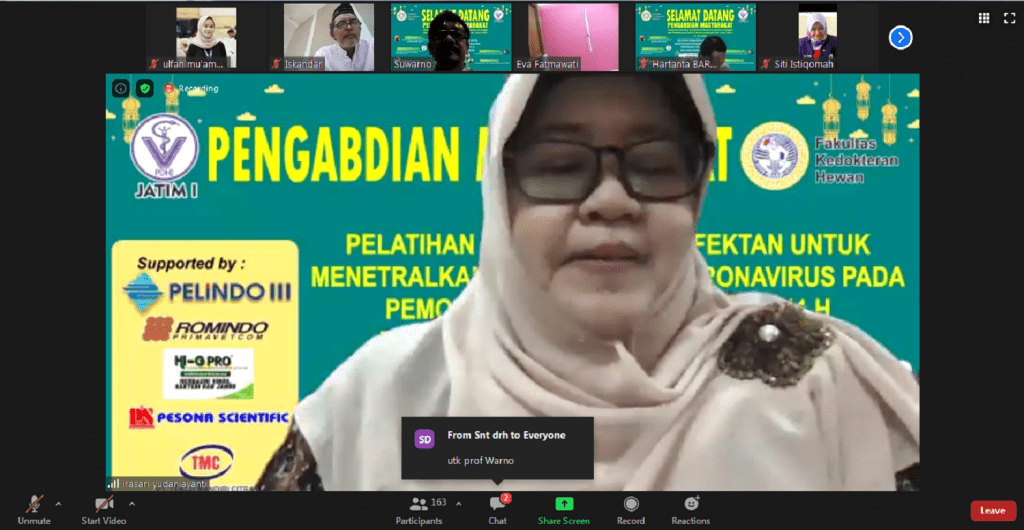
Sacrifice is one of the most recommended practices during Eid al-Adha. However, this Eid al-Adha must be held a little differently because it takes place in the midst of the Covid-19 pandemic.
Considering this, Faculty of Veterinary Medicine (FKH) Universitas Airlangga (UNAIR) in collaboration with PDHI Jatim 1, held a community service online seminar entitled “Training on Disinfectant Making to Neutralize Coronavirus Pollution in Qurban Animal Slaughtering 1441 H for Takmir in Surabaya City”. It was held via zoom on Sunday (19/7/20) with a total of around 168 participants.
The role of MUI
In the webinar, Prof. Dr. Sugijanto, Apt. (Chairman of LPPOM MUI East Java) said that the Indonesian Ulema Council (MUI) has issued a fatwa regarding the handling of sacrificial animals during the pandemic. It is stated in MUI Fatwa No. 36 of 2020 concerning Eid al-Adha Prayers and the Slaughter of Sacrificial Animals During the Covid-19 Outbreak.
“The covid outbreak is not yet under control, so we must increase vigilance, so we need qurban guidelines during this pandemic,” said Prof. Sugijanto.
In addition, in the implementation of the Eid al-Adha prayer, MUI has also issued several provisions. These provisions are contained in number 14 of 2020 concerning the implementation of worship during the Covid-19 pandemic; number 28 of 2020 concerning guidelines for takbir and Eid prayer during the Covid-19 pandemic; and number 31 of 2020 concerning the organization of Friday prayers and congregations to prevent transmission of the Covid-19 outbreak.
“Mosque administrators must still carry out Eid al-Adha prayers but still adhere to the covid health protocol,” he said.
Prof. Sugijanto emphasized that the implementation of sacrificial slaughter must maintain health protocols to prevent and minimize the potential for transmission. All parties involved must maintain physical distance and minimize crowds. Maintain cleanliness and halalness in the slaughtering process, butchers, places, tools, and meat.
How to Perform Sacrifice during Pandemic
Then, Bela Bima Ferial Java, ST, MT. (Director of PD RPH Surya Surabaya) also strengthened the Qurban Animal Meat Management and Processing. Bela explained the procedures for qurbani starting from ordering animals, slaughtering, packaging, and distribution.
Booking animals is recommended online, if you have to meet face-to-face, you must adhere to health protocols (wear a mask, keep your distance, provide hand sanitizer). Then, limit access to the entrance to facilitate supervision. Then, before the sacrificial animals are placed, a special disinfection process is carried out in the cage.
Sacrificial animals must be confirmed healthy by a veterinarian to ensure halalness. Then, it is recommended to set a schedule to reduce crowds that can trigger the spread of Covid-19.
“Slaughtering can be done on the first day and on the day of tashriq (three days after Eid al-Adha, ed),” he explained.
The implementation of health protocols must be carried out in the process of organizing the slaughter of sacrificial animals. For example, the use of complete PPE during the disinfection process around the sacrificial slaughter location, the committee must disinfect the equipment before and after the sacrificial slaughter process.
Then, if there are visitors with temperatures above 37.5oC and above, they are advised to go to the nearest health facility. The public is not allowed to enter the slaughtering area (only representatives are allowed to enter).
The committee is recommended to provide a guest book for personal data collection complete with visiting hours, so that if there are new clusters, they can be tracked easily. In the application of social distancing, the committee is expected to provide a waiting room. In the process of overthrowing animals, good procedures that do not hurt animals should be used.
In the packaging process, body temperature checks must be carried out for all officers packing the sacrificial animals. Then, tools must be disinfected both before and after use. Then weighing as needed and placed in a disinfected basket.
Finally, the committee is prohibited from distributing meat by distributing coupons, which risks expanding the spread of Covid-19. It is expected that there are officers who deliver the meat who are required to wear masks and wash their hands before and after distributing the meat.
Source: http://news.unair.ac.id/2020/07/20/berkurban-di-masa-pandemi-covid-19-begini-caranya/
Writer : Ulfah Mu’amarotul Hikmah
Editor : Binti Q Masruroh
